最新七年级上册英语第二单元知识点总结
Unit 2单元复习知识点 人教新目标英语七年级上册
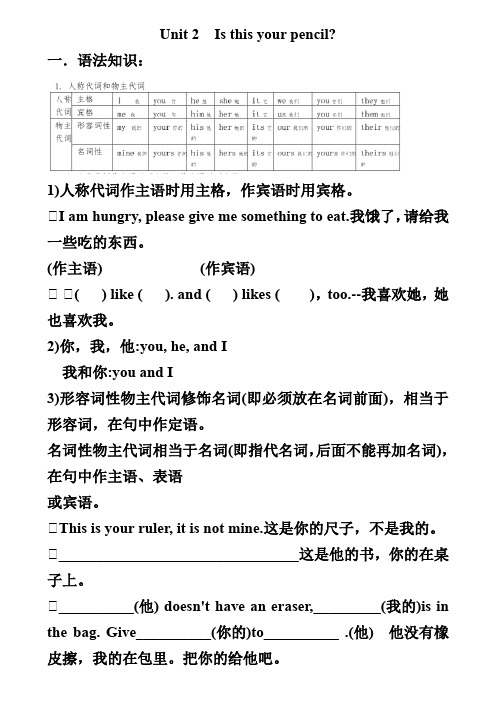
Unit 2 Is this your pencil?一.语法知识:1)人称代词作主语时用主格,作宾语时用宾格。
①I am hungry, please give me something to eat.我饿了,请给我一些吃的东西。
(作主语) (作宾语)① ①( ) like ( ). and ( ) likes ( ),too.--我喜欢她,她也喜欢我。
2)你,我,他:you, he, and I我和你:you and I3)形容词性物主代词修饰名词(即必须放在名词前面),相当于形容词,在句中作定语。
名词性物主代词相当于名词(即指代名词,后面不能再加名词),在句中作主语、表语或宾语。
①This is your ruler, it is not mine.这是你的尺子,不是我的。
①________________________________这是他的书,你的在桌子上。
①__________(他) doesn't have an eraser,_________(我的)is in the bag. Give__________(你的)to__________ .(他) 他没有橡皮擦,我的在包里。
把你的给他吧。
2.Is this/that..,?这/那是...... 吗?Yes, it is. / No, it isn’t.是的,这/那(它)是。
/不,这/那(它)不是。
①回答时,要用it来代替this和that。
Is this/that your ruler? Yes, it is. /No, it isn’t.不可回答Yes, this/that is, / No, this/that isn't.3. Excuse me.请原谅/打扰了(客套语,用于问别人问题、请别人帮忙、打断别人说话等场合。
)Sorry/I’m sorry.“对不起,抱歉”(用于向别人表示歉意)A: Excuse me. Where is my pen?打扰了,我的钢笔在那?B: Sorry/I'm sorry. I don’t know.对不起,我不知道。
七年级上册英语第二单元知识点

七年级上册英语第二单元知识点1. 被动语态被动语态是英语中的一种特殊语态,用于描述动作的承受者或受事者。
在被动语态中,主语是动作的承受者,而动作的执行者通常被放在介词"by"后面,也可以省略不提。
被动语态通常由"be"动词加上及物动词的过去分词构成,根据不同的时态变化而变化。
例如:"The book was written by the author."(这本书是作者写的。
)2. 惯用语惯用语是指在某种语言中约定俗成的固定搭配或词组,具有固定的含义,在交流中起到语言的丰富和形象的表达作用。
惯用语通常由多个词组成,其含义不能从各个部分的字面意思来理解。
学习和运用惯用语对于提高语言表达的丰富性和准确性具有重要作用。
例如:"It’s raining cats and dogs."(下着瓢泼大雨。
)3. 宾语从句宾语从句是一个句子中的一个分句,用来充当及物动词的宾语,引导宾语从句的连词有:that, whether, if, when, where, why, who, whom, whose, which, and how. 宾语从句常常包括一个主语、谓语和其他成分,除了可以做宾语外,还可以充当介词的宾语。
例如:"I know that you are busy."(我知道你很忙。
)4. 现在完成时现在完成时表示过去某一时刻开始,一直延续到现在的动作或状态。
它常用来强调动作对现在的影响或结果,或者强调动作的持续性。
现在完成时的构成是由"have/has"加上动词的过去分词构成。
例如:"I have lived in Beijing for ten years."(我在北京住了十年了。
)5. 冠词的用法冠词是英语中的一个重要词类,包括不定冠词"a/an"和定冠词"the"。
七年级上册英语第二单元知识点总结
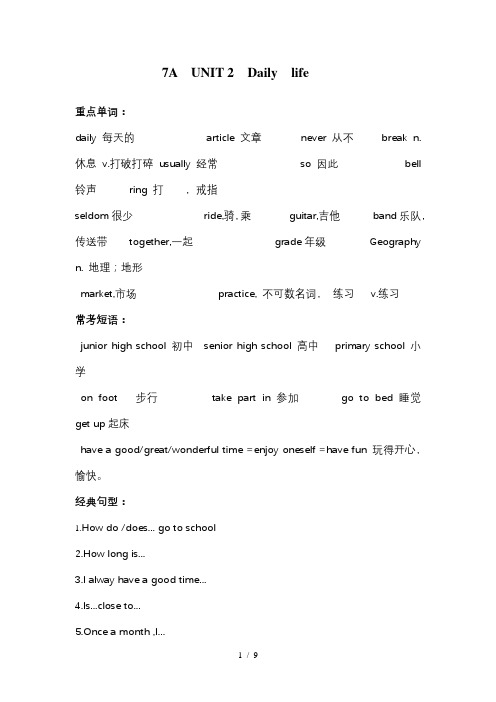
7A UNIT 2 Daily life重点单词:daily 每天的article 文章never从不break n. 休息v.打破打碎usually经常so因此bell 铃声ring 打,戒指seldom很少ride,骑,乘guitar,吉他band乐队,传送带together,一起grade年级Geography n. 地理;地形market,市场practice, 不可数名词,练习v.练习常考短语:junior high school 初中senior high school 高中primary school 小学on foot 步行take part in 参加go to bed睡觉get up起床have a good/great/wonderful time =enjoy oneself =have fun 玩得开心,愉快。
经典句型:1.How do /does... go to school2.How long is...3.I alway have a good time...4.Is...close to...5.Once a month ,I...6.How often do you...7.They think ...as...详细讲解:1.Listen to a boy talking about his weekend.Listen ①不与物动词Listen!The boy is singing.②若要加宾语,要加“to”. 如:Pleasen listen to the teacher.Listen for 留心听2.辨析That’s right .All right与That’s all right①That’s right 对的,正确的。
(对别人所说的话表示肯定)②All right 好吧;身体康复了;令人满意的③That’s all right 不用谢;没关系(客气话和道歉的回应)3.Which of these things do you do once or twice a week(page16)①助动词do/does/did后面要跟动词原形;②once or twice a week每周一两次注意:在英语中,表示一次用“once”,两次用“twice”,表示三次或者三次以上就用“基数词+times”(time在这里是可数名词,表示次数,需要加“s”)如:once a week,twice a week, three(four/ five…)times a week4. brush one’s teeth刷牙(page16)Brush①在这里是动词,表示“刷”②n.可数名词,“刷子”复数形式是“ brushes”。
七年级上册英语unit2知识点归纳

七年级上册英语unit2知识点归纳本文将为大家归纳整理七年级上册英语Unit 2的知识点,旨在帮助学生更好地掌握这一单元所学内容。
一、重点词汇1. wake up:醒来例如:I usually wake up at six o'clock in the morning.2. get up:起床例如:I get up after I wake up.3. have breakfast/lunch/dinner:吃早/午/晚饭例如:I usually have breakfast at seven o'clock in the morning.4. go to school:去上学例如:I usually go to school by bus.5. do homework:做作业例如:I always do my homework after school.6. watch TV:看电视例如:I like to watch TV in the evening.二、动词时态1. 一般现在时例如:I usually wake up at six o'clock in the morning.2. 现在进行时例如:I am doing my homework now.3. 一般过去时例如:I went to the park yesterday.4. 过去进行时例如:I was watching TV when my friend called me.三、日常生活用语1. 问候例如:How are you?2. 对话例如:A:What time do you usually wake up?B:I usually wake up at six o'clock in the morning.3. 请求例如:Can you help me with my homework?4. 命令例如:Clean your room, please.四、其他重要知识点1. 序数词例如:first,second,third,fourth,fifth,sixth,seventh,eighth,ninth,tenth2. 人称代词例如:I,you,he,she,it,we,they总之,七年级上册英语Unit 2的知识点主要包括了一些基础的英语词汇、动词时态和常用口语表达等方面,希望大家通过本文的学习,能够更加熟练地运用这些知识点,从而提高自己的英语水平。
七年级英语上册unit2知识点

七年级英语上册unit2知识点第一个知识点:动词的一般现在时态动词的一般现在时态用于表示现在经常重复或者普遍真理的状态或者行为。
它的构成方式是在动词原形的基础上加“s/es”或者不变形,具体规则根据动词的结尾而定。
例如:I always go to school by bus.He usually eats breakfast at 7am.They like playing soccer.第二个知识点:人称代词和物主代词人称代词用来代替特定的人或者物,分为主格和宾格两种形式。
主格通常在句子中做主语,宾格通常在句子中做宾语。
物主代词则表示所属关系,分为形容词性和名词性两种形式。
形容词性物主代词通常放在名词前面作定语,名词性物主代词则直接替代名词。
例如:She is my friend. (人称代词)I lost my book. (形容词性物主代词)This is hers. (名词性物主代词)第三个知识点:一些常见的时间单位在英语中,一些常见的时间单位有:second(秒),minute(分),hour(时),day(天),week (周),month(月),year(年)它们可以用来描述一段时间的长度或者某个具体的时间点。
例如:It took me five minutes to finish the task.I will have a week's vacation next month.My birthday is on October 13th.第四个知识点:形容词的比较级和最高级形容词的比较级和最高级用于表示两个或者多个事物在某个方面的程度高低或者优劣。
比较级的构成方式是在形容词原形后加“er”,最高级则在形容词原形后加“est”。
如果形容词以“e”结尾,只需要加“r/est”即可。
如果形容词以辅音字母+y结尾,只需要将“y”变成“i”,再加“er/est”。
如果形容词以一个元音字母和一个辅音字母结尾,则要在最后一个辅音字母前加“er/est”。
初一英语上册二单元重点归纳笔记

初一英语上册二单元重点归纳笔记一、词汇与短语1. 介词短语:on the weekend:在周末go to the zoo:去动物园have a pic:野餐fly a kite:放风筝2. 连词:and:和but:但是so:所以3. 形容词:interesting:有趣的boring:无聊的exciting:令人兴奋的noisy:吵闹的4. 动词短语:have a good time:过得愉快 watch TV:看电视play basketball:打篮球二、语法知识1. 现在进行时:She is watching TV.:她正在看电视。
They are playing basketball.:他们正在打篮球。
2. 特殊疑问句:What are you doing?:你在做什么?Where is she going?:她要去哪里?3. 形容词和副词的比较级:more interesting:更有趣的less boring:不那么无聊的noisier:更吵闹的4. 情态动词can和can’t:I can fly a kite.:我会放风筝。
He can’t swim.:他不会游泳。
三、句型和交际用语1. 表示喜欢或不喜欢的句型:I like playing the piano.:我喜欢弹钢琴。
She doesn’t like climbing mount本人ns.:她不喜欢爬山。
2. 表示充分或不充分的句型:She has enough time to finish her homework.:她有足够的时间完成作业。
They don’t have much money to buy a new car.:他们没有足够的钱买新车。
3. 表示买东西或选东西的句型:How much is the kite?:这个风筝多少钱?I want to buy a new dress.:我想买一件新连衣裙。
四、阅读与写作1. 阅读理解:阅读理解部分主要考察学生对文章的理解能力,要注意细节把握和推理能力的培养。
人教版初中英语新教材七年级上Unit2知识点归纳总结(复习必背)

Unit 2 We’re family !学习目标单元主题人与社会→社会服务与人际沟通→和谐家庭必备单词Section A1.mean/mi:n/v.意思是;打算2.husband/'hʌzbənd/n.丈夫3.bat/bæt/n.球棒;球拍4.together/tə'geðə(r)/adv.在一起;共同5.spend/spend/v.花(时间、钱等)6.really/'ri:əli/adv.非常;确实;真正地7.member/'membə(r)/n.成员;会员8.activity/æk'tɪvəti/n.活动9.chess/tʃes/n.国际象棋10.funny/'fʌni/adj.好笑的;奇怪的→fun(n.乐趣)11.laugh/la:f/v.笑;发笑n.笑声12.different/'dɪfrənt/adj.不同的→difference(n.差别;不同)13.violin/,vaɪə'lɪn/n.小提琴Section B1.hat/hæt/n.帽子2.handsome/'hænsəm/adj.英俊的3.knee/ni:/n.膝;膝盖4. grandchild /'græntfaɪld/ n.(pl.grandchildren /'græn,tʃɪldrən/) (外)孙子;(外)孙女5.son/sʌn/n.儿子6.hike/haɪk/v.&n.远足;徒步旅行高频短语e in 进来2.ping-pong bat乒乓球拍3.play ping-pong打乒乓球4.every day每天5.fishing rod钓竿6.a lot of/lots of大量;许多7.Chinese chess中国象棋8.play the erhu 拉二胡9.big and clean classroom 又大又干净的教室10.have fun 玩得11.on the left/right 在左边/右边12.at night在夜晚13.in the middle 中间,中部14.go hiking远足15.family photo 家庭照片16.every week 每周17.next to紧邻;在……近旁18.family tree 家谱常考句型1.询问家庭成员:(1)-Is this/Are these your...?这是/这些是你的······吗?-Yes,.../No,...是的,······/不,······(2)-Who's/Who're...?······是谁?-He's/She's/They're...他是/她是/他(她)们是·······2.询问日常发生的事:-Do you often play ping-pong together?你们经常一起打乒乓球吗?-Yes,we play every day/week.是的,我们每天/每周都打。
七年级上册英语书第二单元
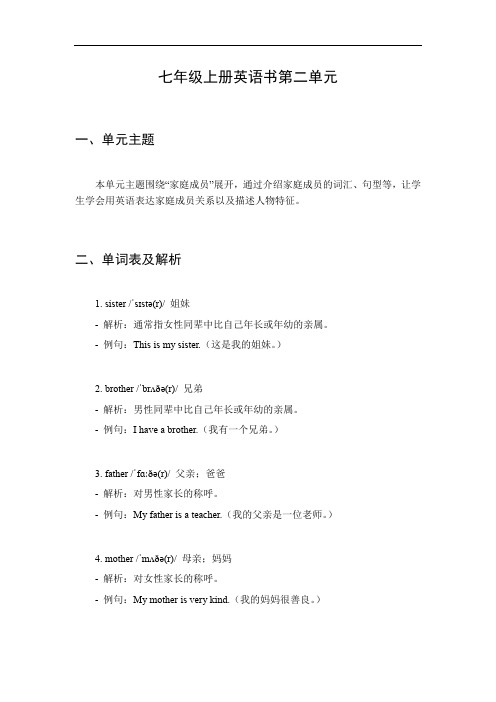
七年级上册英语书第二单元一、单元主题本单元主题围绕“家庭成员”展开,通过介绍家庭成员的词汇、句型等,让学生学会用英语表达家庭成员关系以及描述人物特征。
二、单词表及解析1. sister /ˈsɪstə(r)/ 姐妹-解析:通常指女性同辈中比自己年长或年幼的亲属。
-例句:This is my sister.(这是我的姐妹。
)2. brother /ˈbrʌðə(r)/ 兄弟-解析:男性同辈中比自己年长或年幼的亲属。
-例句:I have a brother.(我有一个兄弟。
)3. father /ˈfɑːðə(r)/ 父亲;爸爸-解析:对男性家长的称呼。
-例句:My father is a teacher.(我的父亲是一位老师。
)4. mother /ˈmʌðə(r)/ 母亲;妈妈-解析:对女性家长的称呼。
-例句:My mother is very kind.(我的妈妈很善良。
)5. parent /ˈpeərənt/ 父(母)亲-解析:是father 和mother 的统称。
-例句:My parents are very busy.(我的父母很忙。
)6. grandfather /ˈɡrænfɑːðə(r)/(外)祖父;爷爷;外公-解析:对父亲的父亲的称呼。
-例句:My grandfather is old.(我的爷爷很老了。
)7. grandmother /ˈɡrænmʌðə(r)/(外)祖母;奶奶;外婆-解析:对父亲的母亲的称呼。
-例句:My grandmother likes to cook.(我的奶奶喜欢做饭。
)8. grandparent /ˈɡrænpeərənt/(外)祖父母;爷爷、奶奶;外公、外婆-解析:grandfather 和grandmother 的统称。
-例句:I love my grandparents.(我爱我的祖父母。
人教版初中英语新教材七年级上starterUnit2知识点归纳总结(复习必背)
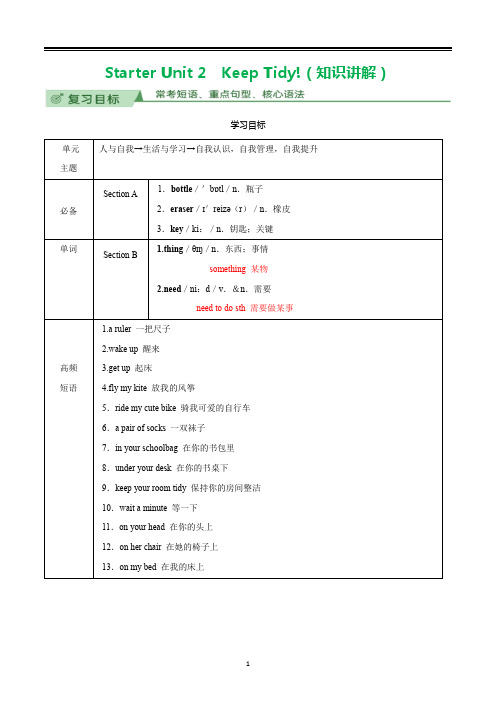
Starter Unit 2 Keep Tidy!(知识讲解)学习目标单元主题人与自我→生活与学习→自我认识,自我管理,自我提升必备Section A1.bottle/'bɒtl/n.瓶子2.eraser/ɪ'reizə(r)/n.橡皮3.key/ki:/n.钥匙;关键单词Section B1.thing/θɪŋ/n.东西;事情something 某物2.need/ni:d/v.&n.需要need to do sth 需要做某事高频短语1.a ruler 一把尺子2.wake up 醒来3.get up 起床4.fly my kite 放我的风筝5.ride my cute bike 骑我可爱的自行车6.a pair of socks 一双袜子7.in your schoolbag 在你的书包里8.under your desk 在你的书桌下9.keep your room tidy 保持你的房间整洁10.wait a minute 等一下11.on your head 在你的头上12.on her chair 在她的椅子上13.on my bed 在我的床上常考句型1.询问拥有的物品:-What do you have in your schoolbag?你的书包里有什么?-I have a cap.我有一顶帽子。
2.What colour is /are...?询问颜色:-What colour is the cap?这顶帽子是什么颜色的?-It's...它是······-What colour are the rulers?这些尺子是什么颜色的?-They're...它们是······3.Is it on/in/under...?确定物品的位置:-Is it in your schoolbag?它在你的书包里吗?-No,it isn't.不,它不在。
初中英语新人教版七年级上册Unit 2 We're family知识点讲解(2024秋)

七年级英语上册Unit 2 We're family知识点【Useful expressions】come in 进来ping-pong bat 乒乓球拍play ping-pong together 一起打乒乓球every day 每天fishing rodspend a lot of / lots of time fishing 花很多时间钓鱼play the piano 弹钢琴play Chinese chess 下中国象棋play basketball 打篮球read a lot 阅读很多play with sb. 和某人一起玩in the playground 在操场上have fun 玩得高兴in the photo 在照片中a photo of... 一张...的照片on the left/right 在左 / 右边read sb. a story 给某人读故事at night 在夜晚in the middle 中间;中部next to紧邻;在……近旁say the same thing to all of us 对我们所有人说同样的话go hiking 远足;徒步旅行the same as 和...一样show great respect to sb. 对某人表示极大的尊敬change... to... 把...换成...live on 继续存在allow sb./sth. to do sth. 允许某人/某物做某事come up with 想出,提出the meaning of ...的意思family tie 家庭纽带【Target sentences】These ping-pong bats are nice. Whose are they?This is my ping-pong bat, and the black / red one is my grandpa's. ---Whose fishing rods are those?---They're my father's.He spends a lot of / lots of time fishing.She can play it really / very well!---whose erhu is this?--- It's Xinyu's erhu.7.---Does she play the erhu well?---Yes, she does.8.They have some nice ping-pong bats.9.---Do you play the piano?---Yes, i do./ No, l don't.10.---Does your father spend a lot of time fishing?---Yes, he does./ No, he doesn't.11.My brother is tall, and he has short hair.12.We are all different, but we have a lot of fun together.13.How many people are there in your family?14.Who are they and what are they like?16.Here's a photo of us.【Language points】1.---Whose fishing rods are those?---They're my father's.(1)whose 对物主提问 ,意为“谁的”; 常用提问句式:Whose +名词(单数)+is +this/that?Whose +名词(复数)+are these/those?Whose is this/that + 名词(单数)?Whose are these/those + 名词(复数)?(2)they 人称代词指代fishing rods.(3)my father's 名词所有格:我父亲的2.They have some nice ping-pong bats.(1) have v.有;作及物动词,意为“有”,其第三人称单数形式是has。
英语外研版七年级上册第二单元
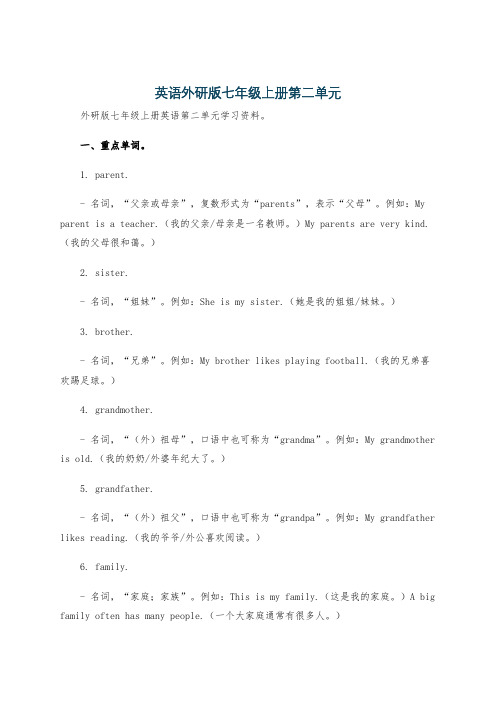
英语外研版七年级上册第二单元外研版七年级上册英语第二单元学习资料。
一、重点单词。
1. parent.- 名词,“父亲或母亲”,复数形式为“parents”,表示“父母”。
例如:My parent is a teacher.(我的父亲/母亲是一名教师。
)My parents are very kind.(我的父母很和蔼。
)2. sister.- 名词,“姐妹”。
例如:She is my sister.(她是我的姐姐/妹妹。
)3. brother.- 名词,“兄弟”。
例如:My brother likes playing football.(我的兄弟喜欢踢足球。
)4. grandmother.- 名词,“(外)祖母”,口语中也可称为“grandma”。
例如:My grandmother is old.(我的奶奶/外婆年纪大了。
)5. grandfather.- 名词,“(外)祖父”,口语中也可称为“grandpa”。
例如:My grandfather likes reading.(我的爷爷/外公喜欢阅读。
)6. family.- 名词,“家庭;家族”。
例如:This is my family.(这是我的家庭。
)A big family often has many people.(一个大家庭通常有很多人。
)7. those.- 代词,“那些”,是that的复数形式。
例如:Those are my books.(那些是我的书。
)8. these.- 代词,“这些”,是this的复数形式。
例如:These are my pens.(这些是我的钢笔。
)9. they.- 代词,“他/她/它们”,是主格形式,在句中作主语。
例如:They are my friends.(他们是我的朋友。
)10. well.- 副词,“很好地;充分地”,也可作形容词表示“健康的”。
例如:He can play football well.(他足球踢得很好。
七年级上册英语Unit2知识点归纳总结
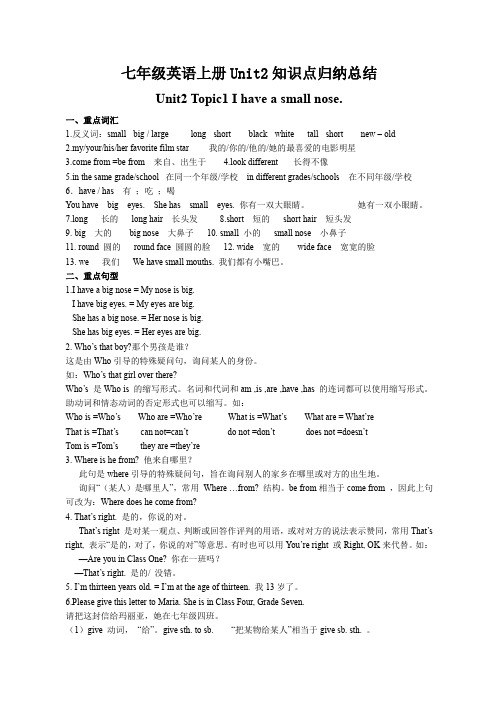
七年级英语上册Unit2知识点归纳总结Unit2 Topic1 I have a small nose.一、重点词汇1.反义词:small - big / large long - short black - white tall - short new – old2.my/your/his/her favorite film star我的/你的/他的/她的最喜爱的电影明星e from =be from来自、出生于4.look different长得不像5.in the same grade/school在同一个年级/学校in different grades/schools在不同年级/学校6.have / has 有;吃;喝You have big eyes. She has small eyes. 你有一双大眼睛。
她有一双小眼睛。
7.long 长的long hair 长头发8.short 短的short hair 短头发9. big 大的big nose 大鼻子10. small 小的small nose 小鼻子11. round 圆的round face 圆圆的脸12. wide 宽的wide face 宽宽的脸13. we 我们We have small mouths. 我们都有小嘴巴。
二、重点句型1.I have a big nose = My nose is big.I have big eyes. = My eyes are big.She has a big nose. = Her nose is big.She has big eyes. = Her eyes are big.2. Who’s that boy?那个男孩是谁?这是由Who引导的特殊疑问句,询问某人的身份。
如:Who’s that girl over there?Who’s 是Who is 的缩写形式。
名词和代词和am ,is ,are ,have ,has 的连词都可以使用缩写形式。
英语七年级上册一二单元知识点归纳
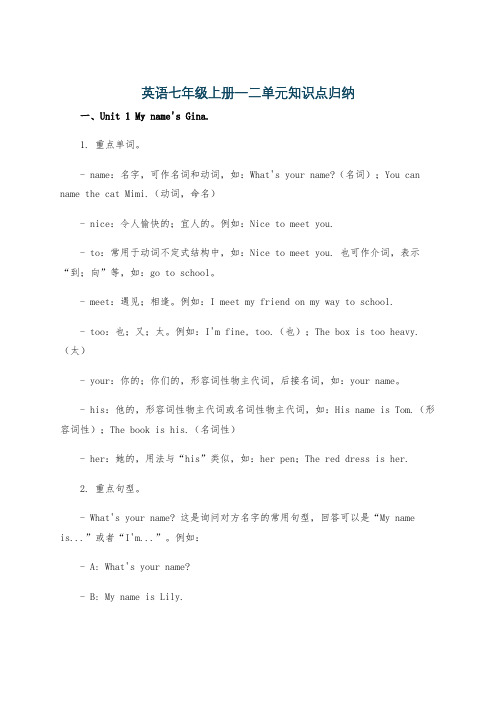
英语七年级上册一二单元知识点归纳一、Unit 1 My name's Gina.1. 重点单词。
- name:名字,可作名词和动词,如:What's your name?(名词);You can name the cat Mimi.(动词,命名)- nice:令人愉快的;宜人的。
例如:Nice to meet you.- to:常用于动词不定式结构中,如:Nice to meet you. 也可作介词,表示“到;向”等,如:go to school。
- meet:遇见;相逢。
例如:I meet my friend on my way to school.- too:也;又;太。
例如:I'm fine, too.(也);The box is too heavy.(太)- your:你的;你们的,形容词性物主代词,后接名词,如:your name。
- his:他的,形容词性物主代词或名词性物主代词,如:His name is Tom.(形容词性);The book is his.(名词性)- her:她的,用法与“his”类似,如:her pen;The red dress is her.2. 重点句型。
- What's your name? 这是询问对方名字的常用句型,回答可以是“My name is...”或者“I'm...”。
例如:- A: What's your name?- B: My name is Lily.- Nice to meet you. 用于初次见面时的问候,回答是“Nice to meet you, too.”。
- I'm.../My name is... 用于自我介绍,例如:I'm Jack.或者My name is Lucy.3. 语法点。
- 形容词性物主代词:your(你的/你们的)、his(他的)、her(她的)。
七年级上册英语第二单元总结知识点
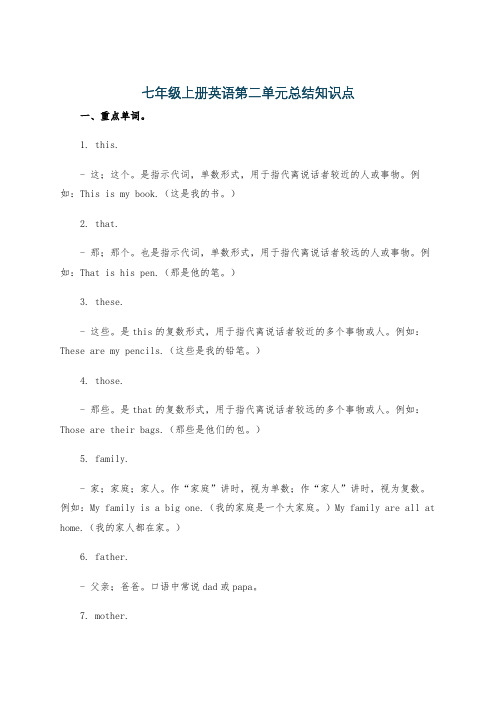
七年级上册英语第二单元总结知识点一、重点单词。
1. this.- 这;这个。
是指示代词,单数形式,用于指代离说话者较近的人或事物。
例如:This is my book.(这是我的书。
)2. that.- 那;那个。
也是指示代词,单数形式,用于指代离说话者较远的人或事物。
例如:That is his pen.(那是他的笔。
)3. these.- 这些。
是this的复数形式,用于指代离说话者较近的多个事物或人。
例如:These are my pencils.(这些是我的铅笔。
)4. those.- 那些。
是that的复数形式,用于指代离说话者较远的多个事物或人。
例如:Those are their bags.(那些是他们的包。
)5. family.- 家;家庭;家人。
作“家庭”讲时,视为单数;作“家人”讲时,视为复数。
例如:My family is a big one.(我的家庭是一个大家庭。
)My family are all at home.(我的家人都在家。
)6. father.- 父亲;爸爸。
口语中常说dad或papa。
7. mother.- 母亲;妈妈。
口语中常说mom或mum。
8. parent.- 父(母)亲。
复数形式是parents,表示“父母”。
9. grandfather.- (外)祖父;爷爷;外公。
口语中可称为grandpa。
10. grandmother.- (外)祖母;奶奶;外婆。
口语中可称为grandma。
11. grandparent.- 祖父(母);外祖父(母)。
复数形式是grandparents,表示“(外)祖父母”。
12. son.- 儿子。
13. daughter.- 女儿。
14. cousin.- 堂兄(弟、姐、妹);表兄(弟、姐、妹)。
15. uncle.- 叔叔;伯伯;舅舅;姑父;姨父。
16. aunt.- 姑母;姨母;伯母;婶母;舅母。
17. photo.- 照片。
Unit2知识点汇总2024-2025学年(2024)七年级英语上册

新版外研社英语七(上)Unit2 知识点汇总一.词性变化1.fun(n.乐趣;adj.有趣的)——funny(adj.有趣的;滑稽的)2.sound:n.声音v.听起来3.different(adj.不同的)——difference(n.差异)4.sudden(adj.突然的)+ly(副词后缀)=suddenly(adv.突然地)5.feel(v.觉得)+ing(名词后缀)=feeling(n.感觉)6.direct(adj.直接的)+ly(副词后缀)=directly(adv.直接地)7.love(v.爱)去e+er(名词后缀,表示人)=lover(n.爱好者)8.plete(v.竞争)——petition(n.竞争)9.act(v.行动)+ion(名词后缀)=action(n.行为;行动)10.a(形容词前缀)+wake(v.醒来)=awake(adj.醒着的)11.mid(前缀,中间的)+night(n.晚上)=midnight(n.午夜)12.shelf(n.架子)——(pl.shelevs)13.nervous(adj.神经紧张的)+ly(副词后缀)=nervously(adv.焦虑不安地)14.write(v.写)+ing(名词后缀)=writing(n.写作)15.end(v.结束)+ing(名词后缀)=ending(n.结局)二.重点短语1.plant flowers 种花2.ride a bike 骑自行车3.play the violin 拉小提琴4.rock music 摇滚乐5.e out 1. 出来2. 开花3. 出版6.play the electric guitar 弹电吉他7.write songs 写歌8.at this moment 在这时;此刻9.the sound of... ……的声音10.a different kind of... 一种不同类型的……11.a fan of.. 一个……的迷12.put together 组合13.rush into 冲进14.decide to do sth. 决定做某事15.nod to sb. 向某人点头16.fire up 发动(机器),启动(设备)17.take part in=join in 参加某活动18.have great fun 玩得开心19.have interest in 对……感兴趣20.win the first prize 获一等奖21.from then on 从那时起22.start to do sth. 开始做某事23.hundreds of 成百上千的24.take...for example 以……为例25.more and more 越来越多26.fly into 飞进;飞入27.on the ground 在地上28.hold up 举起;抬起29.fly away 飞走30.at the beginning 在开头31.take off 起飞32.take sb. To sp. 带某人去某地33.make a poster 制作海报34.at midnight 在午夜35.tap on the door 轻敲门36.on a shelf 在架子上37.feel a bit lonely 感到有点孤独38.shake one’s head 摇头39.want to do sth. 想要做某事40.make friends 交朋友41.look forward 环顾四周;到处看看42.on Wednesday 在周三三.重点句子1.What is your hobby?你的爱好是什么?2.What do you think of their hobbies?你认为它们的爱好怎么样?3.There is so much fun in music.音乐有很多乐趣。
七年级英语上册第二单元的必背知识点
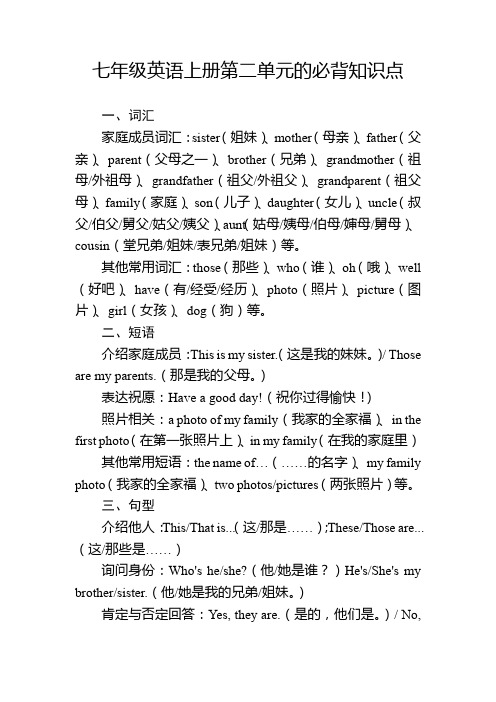
七年级英语上册第二单元的必背知识点一、词汇家庭成员词汇:sister(姐妹)、mother(母亲)、father(父亲)、parent(父母之一)、brother(兄弟)、grandmother(祖母/外祖母)、grandfather(祖父/外祖父)、grandparent(祖父母)、family(家庭)、son(儿子)、daughter(女儿)、uncle(叔父/伯父/舅父/姑父/姨父)、aunt(姑母/姨母/伯母/婶母/舅母)、cousin(堂兄弟/姐妹/表兄弟/姐妹)等。
其他常用词汇:those(那些)、who(谁)、oh(哦)、well (好吧)、have(有/经受/经历)、photo(照片)、picture(图片)、girl(女孩)、dog(狗)等。
二、短语介绍家庭成员:This is my sister.(这是我的妹妹。
)/ Those are my parents.(那是我的父母。
)表达祝愿:Have a good day!(祝你过得愉快!)照片相关:a photo of my family(我家的全家福)、in the first photo(在第一张照片上)、in my family(在我的家庭里)其他常用短语:the name of…(……的名字)、my family photo(我家的全家福)、two photos/pictures(两张照片)等。
三、句型介绍他人:This/That is...(这/那是……);These/Those are...(这/那些是……)询问身份:Who's he/she?(他/她是谁?)He's/She's my brother/sister.(他/她是我的兄弟/姐妹。
)肯定与否定回答:Yes, they are.(是的,他们是。
)/ No,they aren't.(不,他们不是。
)照片描述:Here are two nice photos of my family.(这是我家两张漂亮的照片。
七年级英语上册第二单元知识点小红书
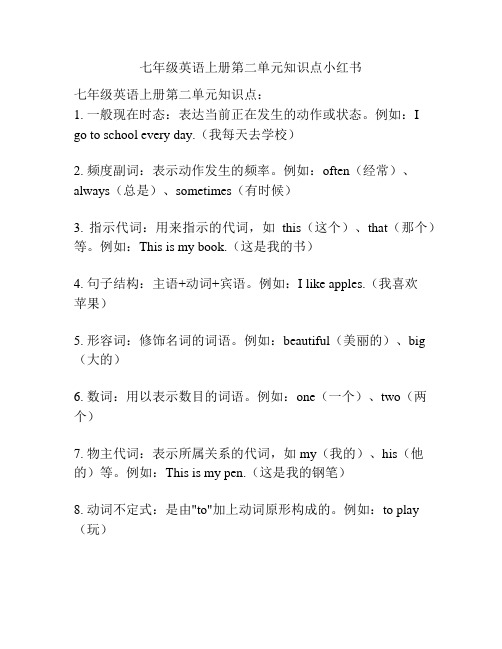
七年级英语上册第二单元知识点小红书
七年级英语上册第二单元知识点:
1. 一般现在时态:表达当前正在发生的动作或状态。
例如:I go to school every day.(我每天去学校)
2. 频度副词:表示动作发生的频率。
例如:often(经常)、always(总是)、sometimes(有时候)
3. 指示代词:用来指示的代词,如this(这个)、that(那个)等。
例如:This is my book.(这是我的书)
4. 句子结构:主语+动词+宾语。
例如:I like apples.(我喜欢
苹果)
5. 形容词:修饰名词的词语。
例如:beautiful(美丽的)、big (大的)
6. 数词:用以表示数目的词语。
例如:one(一个)、two(两个)
7. 物主代词:表示所属关系的代词,如my(我的)、his(他的)等。
例如:This is my pen.(这是我的钢笔)
8. 动词不定式:是由"to"加上动词原形构成的。
例如:to play (玩)
9. 月份:表示一年中的月份的词语。
例如:January(一月)、February(二月)。
七年级上册英语二单元的知识点
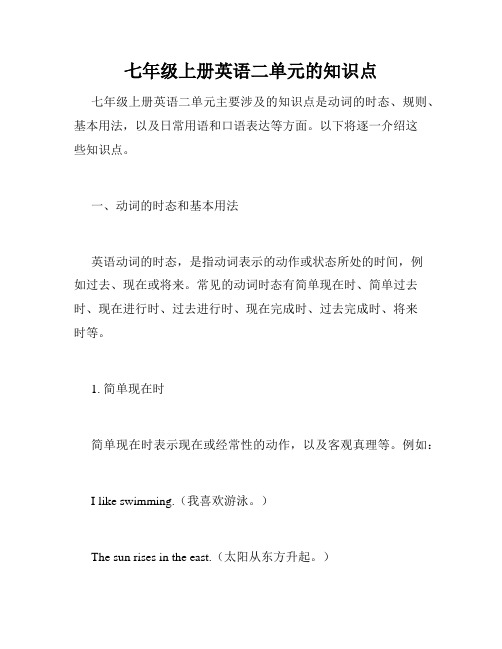
七年级上册英语二单元的知识点七年级上册英语二单元主要涉及的知识点是动词的时态、规则、基本用法,以及日常用语和口语表达等方面。
以下将逐一介绍这些知识点。
一、动词的时态和基本用法英语动词的时态,是指动词表示的动作或状态所处的时间,例如过去、现在或将来。
常见的动词时态有简单现在时、简单过去时、现在进行时、过去进行时、现在完成时、过去完成时、将来时等。
1. 简单现在时简单现在时表示现在或经常性的动作,以及客观真理等。
例如:I like swimming.(我喜欢游泳。
)The sun rises in the east.(太阳从东方升起。
)2. 简单过去时简单过去时表示过去发生的动作或状态。
如:They went to the park yesterday.(他们昨天去了公园。
)She played the piano when she was young.(她小时候弹钢琴。
)3. 现在进行时现在进行时表示正在进行的动作或状态。
如:I am studying English now.(我现在正在学英语。
)She is watching TV at home.(她正在家看电视。
)4. 过去进行时过去进行时表示过去某一时间正在进行的动作或状态。
如:I was cooking dinner when he came back.(他回来的时候我正在做饭。
)They were walking in the park at that time.(他们那时正在公园散步。
)5. 现在完成时现在完成时表示过去发生的动作或状态对现在造成的影响或结果。
如:I have finished my homework.(我已经完成了我的作业。
)He has been to Beijing twice.(他已经去过北京两次。
)6. 过去完成时过去完成时表示过去某一个时间之前已经完成的动作或状态。
如:We had already eaten dinner when he came back.(他回来的时候我们已经吃过晚饭了。
+Unit2+We're+Family知识点2025学年人教版(2024)七年级英语上册+
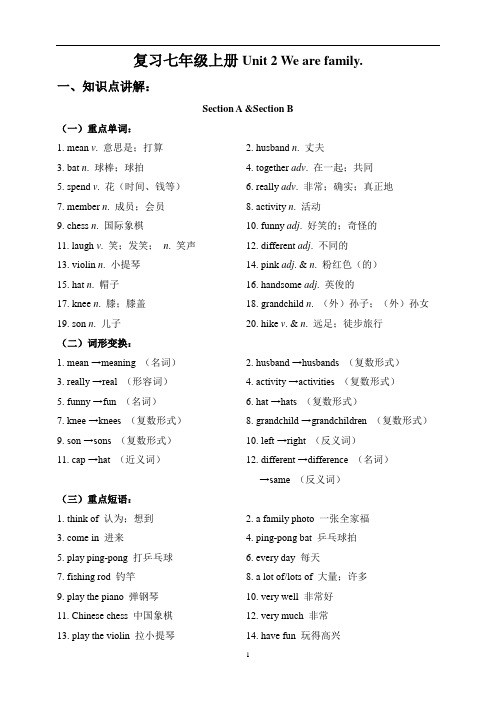
复习七年级上册Unit 2 We are family.一、知识点讲解:Section A &Section B(一)重点单词:1. mean v. 意思是;打算2. husband n. 丈夫3. bat n. 球棒;球拍4. together adv. 在一起;共同5. spend v. 花(时间、钱等)6. really adv. 非常;确实;真正地7. member n. 成员;会员8. activity n. 活动9. chess n. 国际象棋10. funny adj. 好笑的;奇怪的11. laugh v. 笑;发笑;n. 笑声12. different adj. 不同的13. violin n. 小提琴14. pink adj. & n. 粉红色(的)15. hat n. 帽子16. handsome adj. 英俊的17. knee n. 膝;膝盖18. grandchild n. (外)孙子;(外)孙女19. son n. 儿子20. hike v. & n. 远足;徒步旅行(二)词形变换:1. mean →meaning (名词)2. husband →husbands (复数形式)3. really →real (形容词)4. activity →activities (复数形式)5. funny →fun (名词)6. hat →hats (复数形式)7. knee →knees (复数形式)8. grandchild →grandchildren (复数形式)9. son →sons (复数形式)10. left →right (反义词)11. cap →hat (近义词)12. different →difference (名词)→same (反义词)(三)重点短语:1. think of 认为;想到2. a family photo 一张全家福3. come in 进来4. ping-pong bat 乒乓球拍5. play ping-pong 打乒乓球6. every day 每天7. fishing rod 钓竿8. a lot of/lots of 大量;许多9. play the piano 弹钢琴10. very well 非常好11. Chinese chess 中国象棋12. very much 非常13. play the violin 拉小提琴14. have fun 玩得高兴15. a photo of. . . 一张……的照片16. on the left 在左边17. on the right 在右边18. at night 在夜晚19. in the middle 中间;中部20. next to 紧邻;在……近旁21. go hiking 远足;徒步旅行22. a family tree 家谱23. a little 一点儿24. watch films 看电影25. family members 家庭成员26. help each other 相互帮助27. all of us 我们所有人28. favourite grandchild 最喜爱的孙子/女29. read me a story/read a story to me 给我读一个故事(四)重点句型:1. What do you think of the family? 你觉得这个家庭怎么样?2. He spends a lot of / lots of time fishing. 他花很多时间钓鱼。
- 1、下载文档前请自行甄别文档内容的完整性,平台不提供额外的编辑、内容补充、找答案等附加服务。
- 2、"仅部分预览"的文档,不可在线预览部分如存在完整性等问题,可反馈申请退款(可完整预览的文档不适用该条件!)。
- 3、如文档侵犯您的权益,请联系客服反馈,我们会尽快为您处理(人工客服工作时间:9:00-18:30)。
7A UNIT 2 Daily life重点单词:daily 每天的article 文章never从不break n. 休息v.打破打碎usually经常so因此bell 铃声ring 打电话,戒指seldom很少ride,骑,乘guitar,吉他band乐队,传送带together,一起grade年级Geography n. 地理;地形market,市场practice, 不可数名词,练习v.练习常考短语:junior high school 初中senior high school 高中primary school 小学on foot 步行take part in 参加go to bed睡觉get up起床have a good/great/wonderful time =enjoy oneself =have fun 玩得开心,愉快。
经典句型:1.How do /does... go to school?2.How long is...3.I alway have a good time...4.Is...close to...?5.Once a month ,I...6.How often do you...?7.They think ...as...详细讲解:1.Listen to a boy talking about his weekend.Listen ①不及物动词Listen!The boy is singing.②若要加宾语,要加“to”. 如:Pleasen listen to the teacher.Listen for 留心听2.辨析That’s right .All right与That’s all right①That’s right 对的,正确的。
(对别人所说的话表示肯定)②All right 好吧;身体康复了;令人满意的③That’s all right 不用谢;没关系(客气话和道歉的回应)3.Which of these things do you do once or twice a week?(page16)①助动词do/does/did后面要跟动词原形;②once or twice a week每周一两次注意:在英语中,表示一次用“once”,两次用“twice”,表示三次或者三次以上就用“基数词+times”(time在这里是可数名词,表示次数,需要加“s”)如:once a week,twice a week, three(four/ five…)times a week4. brush one’s teeth刷牙(page16)Brush①在这里是动词,表示“刷”②n.可数名词,“刷子”复数形式是“ brushes”。
如:I need some brushes for paiting. Tooth的复数形式是“ teeth”牙齿(因为每个人刷牙的时候不止刷一颗牙齿,所以要用复数)1.how often do you watch television(page 23)2.ride a bicycle 骑自行车(page 16)动词短语,交通工具前要加限定词(如a ,the)同义词:by bicycle/bike 介词短语,交通工具前不用加限定词3.My school is close to my home, so I always go to school on foot.(page17)①be close to 离……近= near =beside= not far away from(上节课学过)②home、family、house的区别③so在此处用作连词,表示结果“因此;所以”的意思。
不可以将because和so同在一个句子里。
(他们两个就像两只老虎,一山不能容二虎。
类似的还有although/ though 和but。
)④go to school on foot= walk to school步行去学校go to…on foot = walk to …4.Classes start at 8 am, and I am seldom late.(page17)①Start 在这里是不及物动词,开始。
同义词:begin 反义词:end、finish还可以做及物动词,后加n./pren./to do/doingstart at: 几点开始②be late: 迟到be late for school ····迟到如:He gets up late in the morning,so he is often late for shcool.Later 副词。
后来,过后。
一段时间+later 如:He come back two days later。
注意:arrive+地点名词=reach /get to (但是后面是home、here、there则不需要加介词)5.I enjoy learning about different places in the world.(page17)①Different:不同的。
反义词:sameBe different from “与····不同”② enjoy doing sth= like/love doing sth. very much 喜欢做某事③learn about:获悉;了解6.We have our morning break at 9:50.a.m.(page17)Break n. 可数名词休息。
have /take a break=have /take a rest 休息一下V.动词。
打破,打碎。
Break the window 打破了窗户11.When the bell rings, I run to the playground with my best friends Tom and Jack.(page17)①when在这里不是表示询问时间,而是一个连词,表示“当···时候”,后面加一个句子。
此处连接两个先后发生的动作;也可表示两个动作同时发生。
② ring 是不及物动词,“打电话”n.电话,环形物(戒指)。
如:give sb. a ring给某人打个电话。
A magic ring 一枚魔戒12.How Short it is.(page17)这是一个由“how”引起的感叹句句型为:how+形容词/副词+主语+谓语(有时也可以省掉主谓语)What+a/an +形容词+单数可数名词+主语+谓语!What a kind man he is!What+形容词+不可数名词/复数名词+主语+谓语!What fine weather it is today!What beautiful flowers these are!exercise是练习,一般用语,可指训练,锻炼,操练等①作可数名词用,“练习,习题,体操,功课,操练”等,常用复数。
I'm doing my exercises.我在做练习/功课。
②作不可数名词用,“锻炼,运动”。
Take more exercise,and you will be healthy.多多锻炼,你会健康的。
③作动词用,“训练,锻炼”。
You must exercise yourself in order to be stronger and healthier.为了更健康更强壮,你必须锻炼自己。
Grammar一、一般现在时(一)含义:表示经常性或习惯性的动作,或表示现在的特征或状态。
1.表示事物或人物的特征、状态。
如:The sky is blue.天空是蓝色的。
2.表示经常性或习惯性的动作。
如:I get up at six every day.我每天六点起床。
3.表示客观现实和普遍真理。
如:The earth goes around the sun.地球绕着太阳转。
4.在时间状语从句和条件状语从句中,用一般现在时表示将来。
如:If you come this aft ernoon, we’ll have a party. 如果你今天下午来,我们就举行一个宴会。
5. 一般现在时还可以表示一个按规定、计划或安排将要发生的情况(这时都有一个表示未来时间的状语)。
但仅限于少数动词。
如: begin, come, leave, go, arrive, start, return, stop, close等。
如:The meeting begins at seven. 7点开会。
(二)一般现在时的构成1. be动词:主语+be(am,is,are)+其它。
如:I am a boy.我是一个男孩。
2.行为动词:主语+行为动词(+其它)。
如:We study English.我们学习英语。
当主语为第三人称单数(he, she,it)时,谓语动词要用第三人称单数,即要在动词后加"-s" 或"-es"。
如:Mary likes Chinese.玛丽喜欢汉语。
(三)一般现在时的变化1. be动词的变化。
①否定句:主语+ be + not +其它。
如:He is not a worker.他不是工人。
②一般疑问句:Be +主语+其它。
如:-Are you a student? -Yes. I am. / No, I'm not.③特殊疑问句:疑问词+一般疑问句。
如:Where is my bike?2.行为动词的变化。
(do/does)①否定句:主语+ don't( doesn't ) +动词原形(+其它)。
如:I don't like bread.当主语为第三人称单数时,要用doesn't构成否定句。
如:She does not play the guitar.②一般疑问句:Do( Does ) +主语+动词原形+其它。
如:- Do you often play football? - Yes, I do. / No, I don't.当主语为第三人称单数时,要用does构成一般疑问句。
如:- Does she go to work by bike? - Yes, she does. / No, she doesn't.③特殊疑问句:疑问词+一般疑问句。
如:How does your father go to work?(四)动词碰到第三人称单数时,要进行相应的变化:动词+s的变化规则1. 一般情况下,直接加-s,如:cook-cooks, milk-milks work - works2. 以s. x. sh. ch. o结尾,加-es,如:guess-guesses, wash-washes, watch-watches, go-goes3. 以“辅音字母+y”结尾,变y为i, 再加-es,如:study-studies carry - carries4. have - has二、频度副词一般现在时常用下列副词或副词短语来作时间状语:always, usually, often, sometimes , seldom, hardly, never, every day(week, year, night), on Sundays, on Monday, in the evening, once/ twice/ three times a month例句: I often visit my teachers. 我经常看望我的老师。
